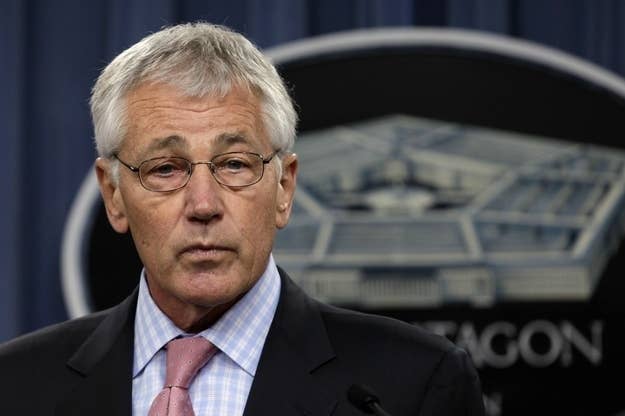
WASHINGTON — Defense Secretary Chuck Hagel announced Thursday that "everyone who serves our country in uniform … should receive all the benefits they deserve." Marine Corps Capt. Matthew Phelps' husband had to leave Japan last month, however, because the Pentagon has not taken action to allow Ben Schock to accompany Phelps on his current assignment in Japan — something that would be available to Schock if he was Phelps' wife.
On Thursday night, Hagel took a shot at state National Guard entities, like that of Texas, that are refusing to recognize married gay couples, yet the Pentagon itself still hasn't fully implemented equal policies for married same-sex service members. For Phelps, so long as his orders say that he is "unaccompanied," Schock is unable to stay in Okinawa, Japan, with Phelps unless he finds a company that would hire and sponsor him for the purpose of obtaining a visa.
"I had to come back home," Schock said from Seattle, "even after we were getting guarantees that once the [Pentagon] benefits [for married same-sex couples] were rolled out, we would get the orders changed, but nothing was happening."
Like those states — which claim that constitutional amendments banning same-sex couples from marrying prevent them from recognizing same-sex couples even for the purpose of allowing the couples to obtain a federal military ID card at state National Guard facilities — the Pentagon claims that Status of Forces agreements (SOFA), agreements reached with foreign countries about the conduct of troops stationed there, must be reviewed to ensure a policy of allowing the same-sex spouse of a service member to join the service member as a dependent on overseas assignments when that would be permitted for opposite-sex spouses would not violate the agreements.
"The Department is carefully reviewing command sponsorship for overseas tours, as well as all applicable Status of Forces agreements," Pentagon spokesman Nathan Christensen told BuzzFeed this week. "The review of applicable Status of Forces agreements is being done in coordination with the Department of State."
Because of that, while Hagel insisted that states "have created hardship and inequality by forcing couples to travel long distances to federal military bases to obtain the ID cards they're entitled to," Schock is living on the other side of the globe with his parents in Seattle — more than 5,700 miles away from his husband in Japan.
Although the circumstances Phelps and Schock find themselves in are rare, they are not alone. Stars and Stripes reported recently about a couple facing difficulties, though not outright separation, because of SOFA-related questions in South Korea.
Even President Obama is pushing the story that the military has done its job to ensure equal treatment of married same-sex couples, noting in his presidential proclamation denoting November as Military Family Month, "And this year, as a result of the Supreme Court decision striking down Section 3 of the Defense of Marriage Act, the Department of Defense moved swiftly to extend benefits to legally married same-sex couples."
Yet, for Phelps and Schock, the situation is anything but settled.
"We're still in a limbo period. With ['don't ask, don't tell'], there was a limbo period because you could be openly gay in the military, but your family wasn't recognized," Schock told BuzzFeed from Seattle. "Then, even with DOMA being repealed, we're in a limbo period again: I'm a full-fledged spouse, but I can't accompany him to Japan. We have to wait and deal with it on our own, when any opposite-sex family, wouldn't have to worry about this."
Although Phelps declined to be interviewed for this report, he has not stayed completely quiet about his experience, writing in a blog post Friday, "I've been posting on Facebook and Twitter lately about how many days it's been since my husband, Ben, had to leave Japan despite having moved here with me in August when I was stationed here with the US Marine Corps. … I miss him so much, and although we are confident things will work out, they haven't yet."

Describing what has happened so far, Schock said, "[W]e got married in May, DOMA was [struck down] in June, and then the Department of Defense said, 'Give us some time to implement benefits for same-sex spouses,' and we were told that was going to be soon. So, when Matthew got his orders, he had to be in Japan the 1st of August, so we bought a commercial plane ticket because at that moment I still wasn't recognized as a spouse … so I could join him in Japan. I was able to stay on base with him in his living quarters as a guest."
Then, in August, the Pentagon did announce, in a memorandum from Hagel, "It is now the Department's policy to treat all married military personnel equally" — a change that went into effect, for most purposes, in September.
After that, Schock said, "we … went to enroll [me] as a spouse, dependent. We did all that and it went through perfectly. Nobody blinked an eye or anything or had any qualms with that."
As Phelps explained it, he discussed his "unaccompanied" orders with his chain of command before leaving for Okinawa, and was told that once his marriage to Schock was recognized by the Pentagon his orders would be changed to "accompanied."
In September, Phelps wrote, "I advised my monitor that Ben had been added as a dependent, and my monitor responded that it would only be a matter of days before my tour conversion was processed to convert my tour from unaccompanied to accompanied."
Nothing has happened since. "That's the issue that we're waiting for right now," Schock said. "That would allow me to stay in the country with him as long as he's in the country."
Phelps wrote, though, that no change has come.
"Initial responses from my monitor were that it would take just a few more days. More recent responses have been that he had been told to stand by until Headquarters Marine Corps issued a policy on same-sex spouses accompanying their military spouses on overseas assignments," he wrote.
"With my passport, I was only allowed to stay in the country for 90 days," Schock said. "With his orders not being changed … I had to, essentially, leave Japan because my 90 days was up."
And now, from Seattle, he waits — but remains hopeful.
"I'm hoping that they could make some sort of policy to allow us to be together, whether to get my SOFA status, be a normal family abroad. I guess that's what I'm hoping for, is to get this to be another small detour in [reaching] equality. We keep hearing, 'It'll be soon. Be patient,' and I guess we can. I'm just in this very — I had to uproot myself again from Japan and back to the United States. I guess that's just the hardest part, is not knowing when they're going to change it and how they're going to change it," he said.
"Matthew and I have been very hopeful in the Marine Corps, and we still have faith in the military and the Marine Corps — and that they want to do what's right."

